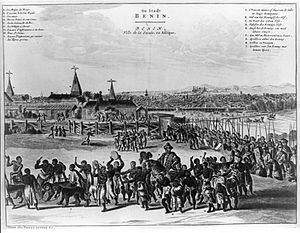History of Nigeria (1500–1800) facts for kids

Before 1900, the land we now call Nigeria was home to many strong kingdoms and empires. These included the Oyo Empire and the Islamic Kanem-Bornu Empire in the northeast. In the southeast, there was the Igbo kingdom of Onitsha, along with various Hausa-Fulani kingdoms.
Archeologists have found that early Hausa civilizations were quite advanced. They learned to work with iron, which helped them make tools and weapons. They also had rich cultures and built strong stone walls around their settlements for protection. These groups sometimes fought each other as they grew in power.
These kingdoms grew partly because of trade across the Sahara Desert. Later, in the late 1700s, they became even more powerful due to the demand for people by European colonies. However, after the Napoleonic period, European countries slowly stopped this trade. This led to a decline in the power of the West African empires. In the 1800s, European influence grew, leading to the "Scramble for Africa." By 1900, Britain had taken control, forming the Northern and Southern Nigeria protectorates.
Contents
Powerful Kingdoms of the Savannah
In the 1500s, the Songhai Empire was very large, stretching across West Africa and including parts of Hausaland. At the same time, the Sayfawa dynasty of Kanem-Bornu took back its homeland and expanded its control over Hausa cities not ruled by Songhai. Songhai's influence helped Islamic learning and culture to grow.
However, Songhai fell in 1591 when a Moroccan army took over its main cities. Morocco couldn't control the whole empire, so many areas, including the Hausa states, became independent. This collapse changed the history of the region.
Kanem-Bornu became very strong under its ruler, mai Idris Aluma (around 1569–1600). With Songhai gone, Borno was the most powerful kingdom in northern Nigeria until the 1700s. But even with Borno in charge, the Hausa states kept fighting among themselves for power.
Borno's power slowly weakened. It couldn't stop the rivalries between Hausa cities. Also, the Tuareg people from Agades became a military threat, moving into Borno's northern areas. A big reason for Borno's decline was a severe drought that hit the region in the mid-1700s. This drought caused Borno to lose many northern lands to the Tuareg, who could move around more easily to find resources. Borno regained some strength later, but another drought in the 1790s weakened it again.
Archeologists use carbon dating to find the earliest signs of outside contact in the Hausa area. They found old sites on hills, large settlements, and places where iron was worked. Objects found in burial mounds, like beads, might have come from as far away as India. An Arabic-written pot was also found near Birnin Leka. These early contacts began to change how Hausa society was organized.
The droughts and political problems set the stage for the jihad (holy war) led by Usman dan Fodio. The constant fighting between Hausa states used up resources, while droughts and famine hurt farmers and herders. Many Fulani people moved into Hausaland and Borno. Their arrival caused more tension because they didn't feel loyal to the local rulers, who saw them as a way to collect more taxes. By the late 1700s, some Muslim scholars began to speak out about the problems faced by ordinary people. Efforts to control these religious leaders only made things worse, leading to the jihad.
Akwa Akpa: A Trading City
The city-state of Akwa Akpa was founded in 1786 by Efik families. They were a branch of the Ibibio who moved from Creek Town, further up the Calabar River. They settled on the east bank of the river. From this spot, they could control trade with European ships that came to anchor there. Soon, they became the most powerful Ibibio merchants in the area.
Europeans called this city "Old Calabar." The city became a major trading hub. Most of the ships that took people from Calabar were English, mainly from Bristol and Liverpool. The main group of people taken from Calabar were the Igbo, even though they were not the main ethnic group living in the area. Many Igbo people were brought there from wars happening further inland to be traded.
Igbo Kingdoms and Culture
The Onitsha Kingdom was first settled by Igbo in the 1500s. Later, groups like the Igala and Igbo traders from inland areas also settled in Onitsha in the 1700s. Another Igbo kingdom that formed was Arochukwu. It appeared after the Aro-Ibibio wars, which lasted from 1630 to 1720. The Aro Confederacy became very powerful in southeastern Nigeria, with some influence in Equatorial Guinea and Cameroon.
The Igbo people had many gods, similar to the Yoruba. However, their gods were seen as more equal to each other and to humans, which reflected how Igbo society was organized. Many local shrines and spiritual guides were popular. The main goddess was Ala, the earth mother and goddess of fertility. She was honored at shrines all over Igboland.
Some people used to think that the Igbo had no formal states before colonial times. This was because there wasn't much historical writing about early Igbo society. However, archeological finds at Igbo Ukwu have shown a rich culture in the heart of the Igbo region as far back as the 700s. But there is less evidence for the period between then and the oral stories collected in the 1900s. The Benin Empire had a lot of influence on the western Igbo. They adopted many political structures similar to those in the Yoruba-Benin region. Ofega was a queen for the Onitsha Igbo.
See also
- Hausa Kingdoms
- Sahelian Kingdoms
- African slave trade
- Trans-Saharan slave trade
- Atlantic slave trade
 | Madam C. J. Walker |
 | Janet Emerson Bashen |
 | Annie Turnbo Malone |
 | Maggie L. Walker |

